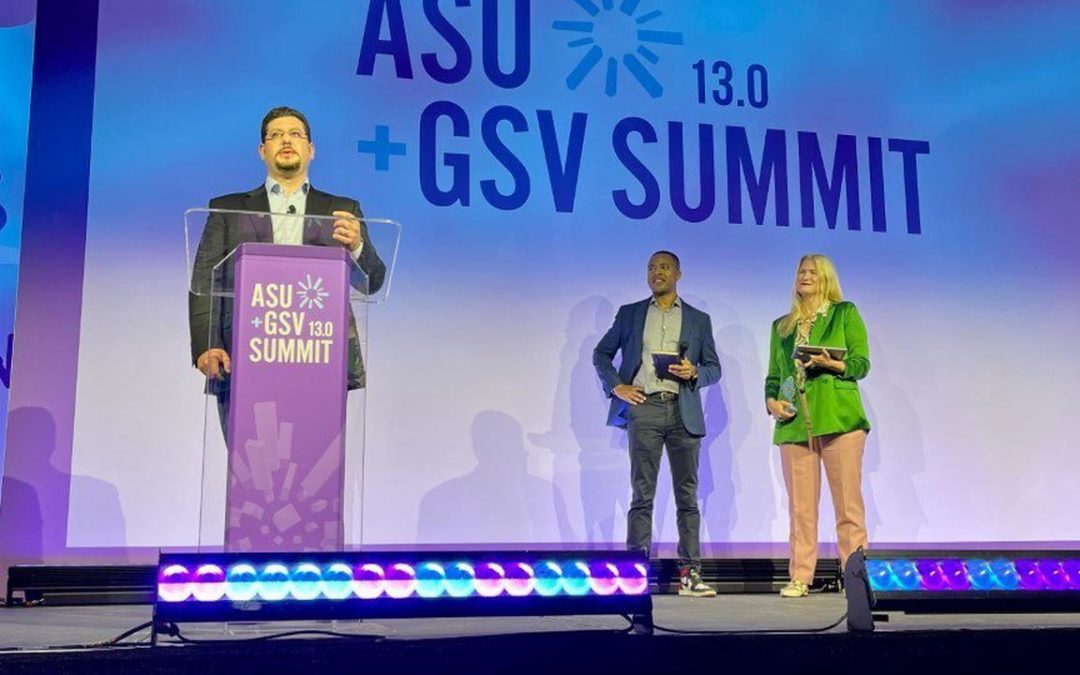Earlier this month, I attended the ASU-GSV Education Summit in San Diego, California. The event, in its 13th year, is organized by Arizona State University and Global Silicon Valley (a venture capital firm which focuses on investments into the education technology industry). I’ve attended for the past 11 years, and the event is always a great gathering of entrepreneurs, educators, non-profits, investors, politicians and celebrities. The Summit has been, since its inception, focused on the mission of giving all people equal access to the future—and that the foundation is access to a quality education.
Over the past two years, we have seen an explosion in the adoption of digital learning around the nation, and around the world. Digital learning was already gaining acceptance pre-pandemic, but the shifts brought about by COVID-19 – to both remote learning and remote work – have dramatically accelerated the adoption, and quality, of digital learning. The discussions at the ASU-GSV Summit, as always, brought visibility to a number of exciting areas in which this is taking place.
The Summit this year reportedly hosted a record 5,700 attendees. For the last several years, the Summit has been held at the Manchester Grand Hyatt in San Diego – a great hotel. But most attendees, like me, come to the Summit for networking meetings, and this year with so many attendees it was VERY difficult to find a place to sit for meetings. I did many meetings just going for walks along the marina. Hopefully in future years, if attendance continues to grow, they will find ways to create more meeting spaces at the hotel.
There were a number of interesting new themes at the Summit this year:
- Closing the Digital Divide – There were two sessions on this topic on the main stage on Wednesday morning. The first session featured a panel which included, among others, Jessica Rosenworcel, the current chairwoman of the FCC. During her introductory remarks, the chairwoman said, “we need to make sure that every kid has the devices, broadband access and Digital Skills to be able to participate in our digital world.” It was like she’d been reading my blog posts! 😊
- A new track of sessions this year focused on Career Readiness education in middle and high school. The track was sponsored by American Student Assistance (ASA) – a national non-profit founded in 1956 as a provider of student loan guarantees for higher education. In recent years, ASA has evolved their focus to giving young people—starting in middle school—the agency to explore education options, career pathways, and to make future plans on their terms. ASA is sponsoring a number of interesting initiatives to expand career education options in middle and high school, leading to better informed students as they enter college, or better direct K-12 to career options. Learning.com operates at the intersection of digital skills education and careers, so these are very timely and thought-provoking initiatives for us.
- Bleeding Edge – Web3, metaverse, games. Another new track focused on how leading-edge future technology developments—AI/Machine Learning, AR/VR, the Metaverse, Web3/blockchain/crypto/NFTs, etc.—can eventually impact education. Some of these developments may drive meaningful impactful in the nearer term, and some will take longer to develop. But these areas are important to keep a watchful eye on.
I also met with several current and potential partners for Learning.com, including:
- Ben Powell of EdBD – EdBD is a service provider to edtech companies and is a current partner of Learning.com; Ben has long experience working in edtech business development and EdBD is delivering great results in their current project with us.
- Tom Luna, Dr. Rod Berger and Adam Giery of Strategos – Strategos is a strategy, public affairs and government advocacy firm focused on the education industry. They have done great work for LCOM on several past projects, and likely future projects as well.
- Dr. Erin Carr-Jordan, Executive Director of the Digital Equity Institute – the Institute is a forward-thinking organization that is working with governments around the world to help close the digital divide by bringing underserved communities access to devices, broadband, digital skills and support. LCOM is proud to be a partner with Erin and her team.
- Curt Allen, CEO of Agilix – Agilix has rolled out a new product, TutorKit, during the pandemic to help districts tackle the learning loss that has had such a dramatic negative effect on our students the past two years.
- Plus a number of private equity investors, investment bankers and others who focus on the education software space, and who share our excitement for the bright future for this industry and for Learning.com’s positioning in particular.
As always, the Summit this year was an amazing gathering for networking, sharing ideas and learning from so many other talented leaders across the industry.
Check out our events page to see where you can catch up with Learning.com in person!

Keith Oelrich
CEO
Keith Oelrich joined Learning.com as CEO in 2012. A pioneer in the K-12 online education market since 2000, Keith has served as CEO of several companies which have collectively provided K-12 online education programs to thousands of districts, tens of thousands of schools and millions of students and their families.
Further Reading
Examples of Technology Literacy: Empowering Students in the Digital Age
Technology has become part of almost every aspect of our lives, shaping how we communicate, learn, work, and solve problems. For today’s students,...
Netiquette as a Tool for Promoting a Positive Classroom Culture
Technology has become an essential part of modern classrooms – beyond being part of “future readiness,” it’s a necessary everyday skill for K-12...
How Keyboarding Skills Enhance Digital Literacy Across Subjects for K-12 Students
In today's rapidly evolving digital landscape, digital literacy is essential for students to thrive in both their academic and future professional...




